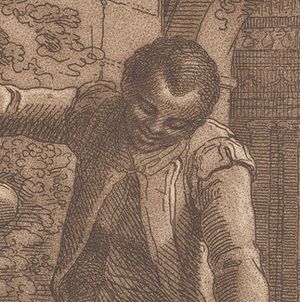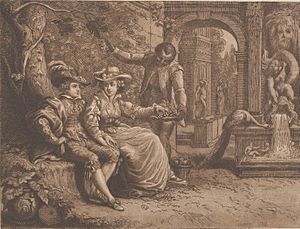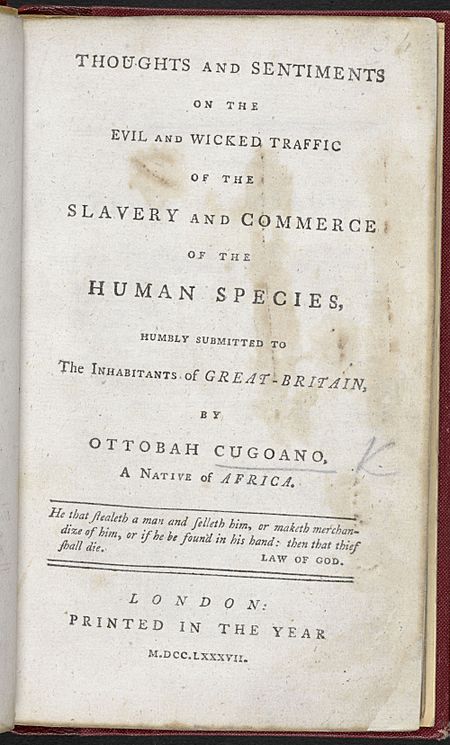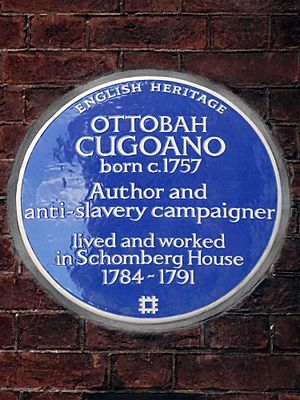Ottobah Cugoano facts for kids
Quick facts for kids
Ottobah Cugoano
|
|
|---|---|

Ottobah Cugoano, 1784 by Richard Cosway
|
|
| Born | c.1757 Ajumako, West Africa
|
| Died | c.1791 (aged 33–34) |
| Other names | John Stuart Quobna Ottobah Cugoano |
|
Notable work
|
Thoughts and Sentiments on the Evil and Wicked Traffic of the Slavery and Commerce of the Human Species (1787) |
Ottobah Cugoano (born around 1757 – died after 1791), also known as John Stuart, was an important person who fought against slavery. He was a political activist and philosopher from West Africa. He lived in Great Britain in the late 1700s.
When he was about 13 years old, Cugoano was captured in the Gold Coast. He was then sold into slavery and taken to Grenada in the Caribbean. In 1772, a merchant bought him and brought him to England. There, Cugoano learned to read and write, and he gained his freedom. He later worked for artists Richard Cosway and Maria Cosway. Through them, he met many important people in Britain. He also joined the Sons of Africa, a group of African people who worked to end slavery in Britain.
Ottobah Cugoano's Early Life
Ottobah Cugoano was born Quobna Ottobah Cugoano in 1757. His birthplace was Agimaque (now Ajumako) in the Gold Coast. This area is part of modern-day Ghana. He belonged to the Fante people, and his family was close to the local chief.
When he was 13, Cugoano was captured along with other children. He was sold into slavery and sent from Cape Coast on a slave ship. The ship took him to Grenada. He worked on a plantation in the Lesser Antilles. In 1772, a Scottish plantation owner named Alexander Campbell bought him. Campbell took Cugoano into his home.
Later in 1772, Campbell visited England and took Cugoano with him. In England, Cugoano was able to become a free man. On August 20, 1773, he was baptized at St James's Church, Piccadilly. He was given the name "John Stuart."
Fighting Against Slavery

In 1784, Cugoano started working for the artists Richard Cosway and his wife, Maria Cosway. Through them, he met famous people like the poet William Blake and the Prince of Wales. Cugoano became very active in the fight against slavery. He joined Olaudah Equiano and other educated Africans in Britain. They formed a group called the Sons of Africa. This group often wrote to newspapers, speaking out against slavery.
In 1786, Cugoano helped a kidnapped black man named Henry Demane. Demane was about to be sent back to the West Indies as a slave. Cugoano quickly contacted Granville Sharp, a well-known person who fought against slavery. Sharp managed to get Demane off the ship before it sailed away.
In 1787, Cugoano published a powerful book against slavery. It was called Thoughts and Sentiments on the Evil and Wicked Traffic of the Slavery and Commerce of the Human Species. His friend Olaudah Equiano might have helped him write it. Cugoano was a strong Christian, and his faith guided his writing. He used ideas from Christianity, economics, and politics to argue against slavery.
His book demanded that slavery be ended completely and that all enslaved people be freed right away. He even argued that enslaved people had a duty to escape. He also said that force should be used to stop anyone from being enslaved again. Copies of his book were sent to King George III, the Prince of Wales, and a leading politician named Edmund Burke. However, King George III and much of the British royal family did not support ending the slave trade.
Four years later, in 1791, Cugoano published a shorter version of his book. This version was specifically for the "Sons of Africa." In it, he supported British efforts to create a colony in Sierra Leone. This colony was for "Poor Blacks" from London. These were mostly freed African-American slaves who had moved to London after the American Revolutionary War. Other settlers included Black Loyalists from Nova Scotia. Cugoano also called for special schools in Britain for African students.
In 1791, Cugoano moved with the Cosways to 12 Queen Street in Mayfair. His last known letter, written in 1791, said he had traveled to "upwards of fifty places" to promote his book. He also noted that "complexion is a predominant prejudice," meaning people were often judged by their skin color. Cugoano wanted to travel to Nova Scotia to find settlers for the new free colony in Sierra Leone, but we don't know if he ever did.
After 1791, there are no more records of Cugoano. It is believed he died in 1791 or 1792.
Remembering Ottobah Cugoano
In November 2020, a special English Heritage blue plaque was put up to honor Cugoano. It is on Schomberg House in Pall Mall, London. This is where he lived and worked with the Cosways from 1784 to 1791.
See also
 In Spanish: Quobna Ottobah Cugoano para niños
In Spanish: Quobna Ottobah Cugoano para niños
- Black British elite
- List of civil rights leaders
- List of slaves
 | James Van Der Zee |
 | Alma Thomas |
 | Ellis Wilson |
 | Margaret Taylor-Burroughs |



